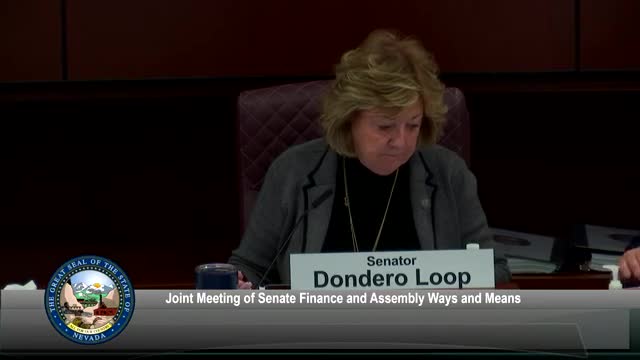Legislative money committees approve CoreDot NV funding, curb some staffing plans and set IFC oversight
Get AI-powered insights, summaries, and transcripts
Subscribe
Summary
The joint Senate Finance and Assembly Ways and Means committees approved a mix of one-time and ongoing funding to continue Nevada's CoreDot NV enterprise resource planning project, but limited immediate hiring and directed further justification and IFC review for several proposed positions and enhancements.
The joint Senate Finance and Assembly Ways and Means committees on Saturday approved a package of funding to continue Nevada’s CoreDot NV enterprise resource planning (ERP) implementation while restricting some immediate hiring and requiring further oversight by the Interim Finance Committee (IFC).
The committees approved appropriation options that included one-time and ongoing funding to carry the Office of Project Management’s work into the 2025–27 biennium and gave staff authority to make technical adjustments. The committees also authorized a letter of intent requiring semiannual reporting to the IFC on project progress, staffing and vendor activity.
Why it matters: CoreDot NV is the state’s multiagency ERP effort to replace legacy finance and human resources systems. Committee members said timely oversight and clearer staffing justifications are needed because the project has large contract and change-control budgets and missed some original timelines.
What the committees approved and limited - The committees approved continuing operating funding for the Office of Project Management, including funding for base positions and two program officer positions inadvertently left out of the base. The action authorized technical corrections to classification and step errors identified by staff. - Rather than immediately funding the full 18‑person production environment operations team proposed by the governor, the committees approved funding for a smaller IT core: five IT professional positions and one IT manager, with those funds appropriated to the IFC contingency account. The Office of Project Management must return to the IFC with additional documentation (workload metrics and clearly defined duties) before receiving the remaining recommended positions. - The committees approved an appropriation of $63.5 million (including amounts from general and highway funds as presented in the packet) to continue phase 2 work for financial and human-resource transformation, and they directed that much of that funding be handled through the IFC contingency process (separate legislation/one-time approach), together with the semiannual reporting requirement. - The committees approved the NeoGov recruitment and learning management integration at a total estimated cost of $2.5 million over the biennium and directed that remaining enhancements be considered through the IFC contingency process when sufficient justification is provided. - The committees approved targeted enhancements for the state treasurer’s cash management replacement (approximately $609,000 for FY26) and approved $583,565 for temporary OCIO HR help‑desk contractors, while declining several larger enhancement requests that lacked supporting documentation.
Committee concerns and staff findings LCB fiscal staff, represented in the hearing by James Malone, told the committees that the project’s timelines had shifted and that some work budgeted in FY25 will now occur in 2026–27. Staff flagged $8.3 million as the projected unencumbered change‑control balance going into FY26 and noted $5.3 million had already been obligated from change control for signed change orders. Staff emphasized the risk of encumbering the full change‑control balance for enhancements and recommended using IFC contingency appropriations for certain items until agencies can provide more detailed justification.
The committees also questioned the mix and classification of positions proposed for the production operations team (for example, why non‑IT classifications such as administrative services officer or public information officer were included), and they asked the Office of Project Management to provide workload statistics and clearer role descriptions before approving the full staffing request.
Next steps The Office of Project Management will work with fiscal staff and, for some positions, the IFC to produce supporting documentation and to request contingency allocations as needed. The committees’ adopted letter of intent requires semiannual IFC reports covering project activities, timelines, vendor deliverables, staffing and any Independent Verification and Validation (IV&V) findings.
Provenance: The CoreDot NV discussion began when the governor’s office budget account 1011325 was introduced as the next budget account for consideration and concluded when the committee moved on to subcommittee reports.
